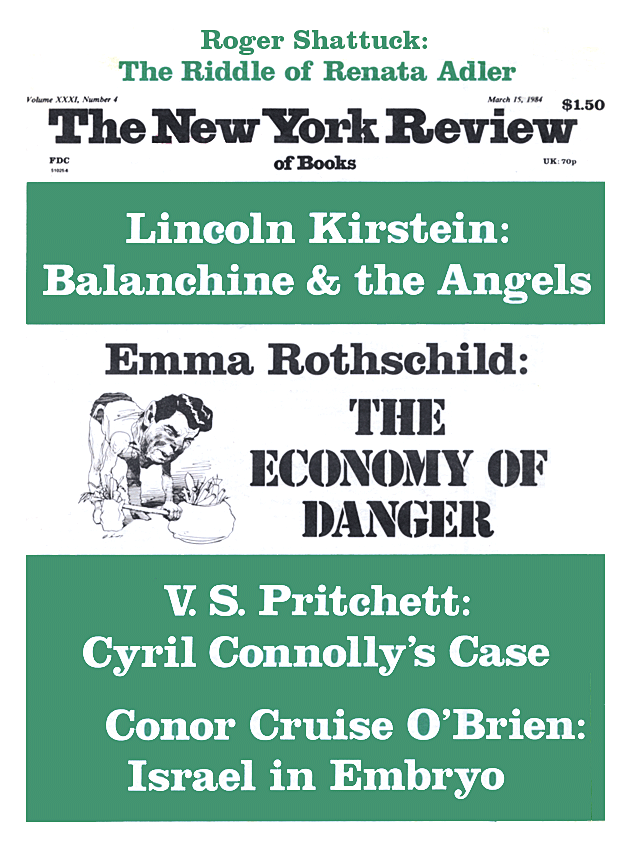In response to:
Trouble in Paradise from the February 2, 1984 issue
To the Editors:
By a peculiar coincidence, The Galapagos Affair by John Treherne, vividly reviewed by Luc Sante [NYR, February 2], resembles very closely an item I’ve been in vain trying to recover, published, I think, around 1930. It may have been translated from the German. I remember only that it was alleged to be a true story. Setting and main characters were the same: an island in the Galapagos, a German couple escaping from the decline of the West. Filled with confidence, they settled in a favorable area with basic materials for survival; they expected to live on the produce they planted, beside supplements of shell fish! Their inceptive Eden was soon invaded by a quarrelsome trio consisting of a licentious woman and two lovers whom she pitted, one against the other. When they tired of this activity they imposed themselves on the German and his wife. By the time they left the island, the Germans were in a state of nervous distraction from this destruction of their privacy and its interference with their labors. If I remember correctly, one lover killed the other before leaving. And the woman who rowed away was an American!
The Germans returned to their task, digging, planting, trenching, with encouraging success. Then enters one of the unique villains of literature: a lone wild boar, immensely cunning and unrelentingly vindictive, who proceeds day after day, night after night, to destroy their handiwork. Eluding capture, he roots up everything they plant, devours what they’ve grown, tramples on their barriers, ruins their trenches. The man becomes obsessed with the belief that the animal is a diabolical incarnation of the American woman. He stands guard with a rifle almost ceaselessly but as if by foreknowledge the boar never appears when the German is alert; he waits until at the end of a sleepless night the watcher’s eyelids droop from exhaustion, then attacks swiftly and destructively and is gone again before the half-conscious man can arouse himself. After a few months of this the half-starving, frustrated couple admit themselves whipped. They have an agreement with a fisherman or some such who passes their island on a given day each month; they are to wave him on or signal to be rescued.
On the night before they expect their rescuer the man manages to shoot the boar. To celebrate their victory and wild relief, they cut off the animal’s head, skin and roast him and gorge happily on the flesh of their defeated enemy. But halfway through their feast, the man springs to his feet, wearing a look of horror, and clutching at his entrails drops dead…. The woman, uncontaminated, leaves the next day.
Clearly, these two “histories” are related. I’m not sure which is better suited to cinematic adaptation but it seems to me the original certainly had a more inspired title: Satan Came to Eden!
Vernon Young
Philadelphia, Pennsylvania
Luc Sante replies:
I am pleased to offer a solution to Mr. Young’s mystery. Satan Came to Eden is the tale told by Dore Strauch to one Walter Brockmann, first published serially in Hearst’s International Cosmopolitan in 1936, and later that year in book form, by Harper and Brothers, New York and London. Dore Strauch, you will recall, was the companion of Friedrich Ritter. Together they arrived on Floreana in 1929, setting off the chain of events described in Treherne’s book.
Strauch’s book is, in fact, one of Treherne’s primary sources, and the copy I found in the New York Public Library shows that Treherne’s account materially differs little from hers. However, her interpretation is colored by emotion, and by a murky belief in predestination. She hints that the Baroness (whom she identifies as Austrian) was murdered by the Wittmers in collusion with the disgruntled exlover who later rowed away. The wild boar mentioned by Mr. Young figures importantly, but Ritter kills it before the series of murders and disappearances occurs, leading Strauch to blame its restless and malevolent spirit for that cycle of calamities.
Mr. Young’s memory has, in the way that memories will, foreshortened the action in an agreeably dramatic fashion. It may be that he has unconsciously devised the cinematic treatment. I agree that the story cries out for translation to the screen. Calling Werner Herzog!
This Issue
March 15, 1984


